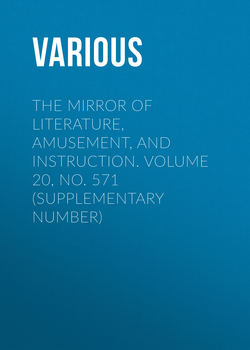Читать книгу The Mirror of Literature, Amusement, and Instruction. Volume 20, No. 571 (Supplementary Number) - Various - Страница 1
ОглавлениеABBOTSFORD, (FROM THE GARDEN, see page 247.)
Sir Walter Scott was the third son of Walter Scott, Esq., Writer to the Signet, in Edinburgh, and Anne, daughter of Dr. John Rutherford, Professor of Medicine in the University of the above city. His ancestry numbers several distinguished persons; though the well-earned fame of Sir Walter Scott readers his pedigree comparatively uninteresting; inasmuch as it illustrates the saw of an olden poet, that
Learning is an addition beyond
Nobility of birth: honour of blood,
Without the ornament of knowledge, is
A glorious ignorance.
SHIRLEY.
Sir Walter was born at Edinburgh, on the 15th of August, 1771—or, on the birthday of Napoleon Buonaparte. His father was a man of prosperous fortune and good report; and for many years was "an elder in the parish church of Old Grey Friars, while Dr. Robertson, the historian, acted as one of the ministers. The other clergyman was Dr. John Erskine, of whom Sir Walter has given an animated picture in his novel of Guy Mannering."1 Mrs. Scott is described as a well-educated gentlewoman, possessing considerable natural talents; though she did not enjoy the acquaintance of Allan Ramsay, Blacklock, Beattie, and Burns, as has been stated by some biographers. She, however, advantageously mixed in literary society, and from her superintendence of the early education of her eldest son, Walter, there is reason to infer that such advantages may have influenced his habits and taste. He was the third of a family, consisting of six sons and one daughter. The cleverest of the sons is stated by Sir Walter to have been Daniel, a sailor, who died young. Thomas, the next brother to Sir Walter, was a man of considerable talent, and before the avowal of the authorship of the Waverley Novels, report ascribed to him a great part or the whole of them. Sir Walter observes—"Those who remember that gentleman (of the 70th regiment, then stationed in Canada) will readily grant, that, with general talent at least equal to those of his elder brother, he added a power of social humour, and a deep insight into human character, which rendered him an universally delightful member of society, and that the habit of composition alone was wanting to render him equally successful as a writer. The Author of Waverley was so persuaded of the truth of this, that he warmly pressed his brother to make such an experiment, and willingly undertook all the trouble of correcting and superintending the press." Ill health, however, unfitted Mr. Scott for the task, though "the author believes his brother would have made himself distinguished in that striking field, in which, since that period, Mr. Cooper has achieved so many triumphs."2
The house in which Sir Walter Scott was born no longer exists. It was situated at the head of the College Wynd, at its entrance into North College-street. It was thus described by Sir Walter in 1825:—"It consisted of two flats above Mr. Keith's, and belonged to my father, Mr. Walter Scott, Writer to the Signet. There I had the chance to be born, 15th of August, 1771. My father, soon after my birth, removed to George's Square, and let the house in the College Wynd, first to Mr. Dundas, of Philipstoun, and afterwards to Mr. William Keith, father of Sir Alexander Keith. It was purchased by the public, together with Mr. Keith's (the inferior floors), and pulled down to make way for the new College."
1
Chamber's Life of Sir Walter Scott.
2
General Preface to the Waverley Novels, 41 vols.
